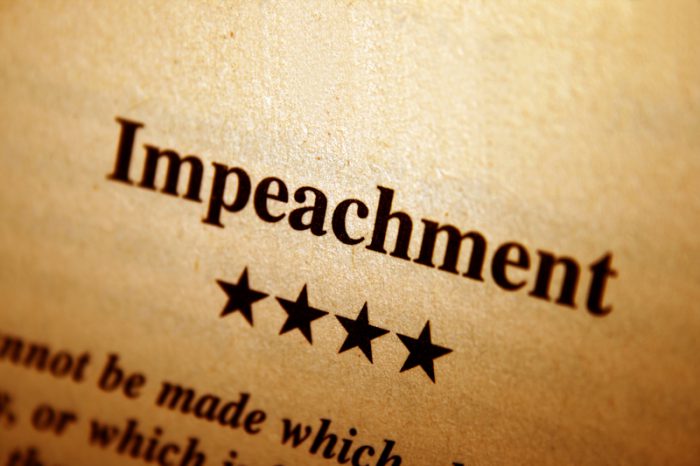Politics is a difficult business — there's almost always a controversy or huge issue to work through. And getting people to completely agree on the solution is next to impossible. But even by these standards, the term of U.S. president Donald Trump has been an exceptional one.
Since being elected in 2016, he has governed with a unique style that has brought both passionate support and fiery opposition. But this week, his actions have brought him an honour he'd surely rather not have.
He is only the third American president to face a vote of impeachment.
As the House of Representatives spends this week voting on this issue, we thought we'd answer a few questions about what it all means, why it exists, and how it has affected the United States in the past.
What is impeachment?
Former Brazilian President Dilma Rousseff was impeached in 2016. (Getty Embed)
Impeachment is a way of charging a government official with offenses against his or her office. It is not just about presidents — judges, senators, and others have been impeached. And it is not just an American process either. In fact, former Brazilian president Dilma Rousseff was impeached in August of 2016. She ended up losing her job, but impeachment doesn't always end that way.
In impeachment, arguments are presented to a government body as to why this official should no longer be in office. It is like a trial. Depending on how the government votes, the official either stays in office or loses their job.
Who votes on this?
Democratic representative Jamie Raskin and Republican representative Doug Collins debate impeachment on December 17, 2019. This is a part of the process. (Getty Embed)
In the case of the United States, it is Congress that votes on impeachment. Congress is made of two groups: The House of Representatives and the Senate. And they each have a different role. The House is the group that starts the process and charges the official. If they vote in favour of removal, the official is charged, or 'impeached', and the case moves to the Senate.
Now the Senate judges the official. If it also votes in favour of removal, then that official is convicted and removed from office.
Why might a president be impeached?
Political disagreements happen all the time. But they don't result in trying to remove a leader before his or her term is over. Instead, impeachment is a very rare event.
The president has to be considered to have committed "treason, bribery, or other high crimes and misdemeanors" while in office. Such as what? These can include conspiring with (plotting with or betraying national secrets to) a foreign nation, abuse of power (such as using the position for personal gain), offering political influence for money, obstruction of justice (trying to prevent fair investigations), or perjury (lying to a court of law). These acts aren't always crimes (though sometimes they are) so much as acts that damage society and people's faith in government.
Whatever offenses the House feels that the president is guilty of, these then are presented as the 'articles of impeachment'.
Why does impeachment exist?
Democratic governments were started as an alternative to monarchy — governments where a king or queen held absolute power for life. That's why in democracies, citizens regularly vote in their representatives every few years. Power constantly changes hands. In most cases, this process helps to keep government in check.
But it is still possible for leaders and officials to abuse their power. Impeachment is there to ensure that such officials can be held responsible and removed.
Which presidents have been impeached in the U.S. before?
Former U.S. President Richard Nixon resigned in 1974... but was never actually impeached. (Getty Embed)
As we said, it is quite rare. Only two previous presidents have been impeached — and both times they were acquitted, or remained in office.
They were President Andrew Johnson in 1867 and President Bill Clinton in 1998.
The one president that many think was impeached is Richard Nixon. However, Nixon resigned (or left office voluntarily) in 1974, after it was clear to him that impeachment would soon occur and that he would be convicted.
 It's a big time in American politics right now. (© Alexskopje - Dreamstime.com)
It's a big time in American politics right now. (© Alexskopje - Dreamstime.com)










If convicted of impeachment, are they just removed from office, or do they go to jail?
😀 Thanks! Now I know what impeachment means!